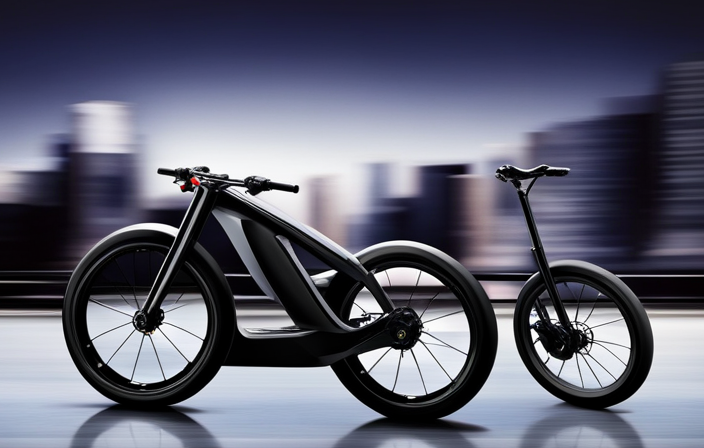Are you aware that the price of electric bicycle batteries can differ greatly based on a variety of factors?
In fact, the average price of an electric bike battery can range anywhere from $200 to $800.
Understanding the factors that affect battery cost, such as battery type and capacity, can help you make an informed decision when purchasing an electric bike.
In this article, we will delve into the different types of electric bike batteries, explore the factors influencing their cost, and provide valuable tips for extending battery lifespan.
Key Takeaways
- The cost of electric bike batteries is influenced by the complex manufacturing processes and global supply chain, which can affect the availability and cost of key materials like lithium and cobalt.
- Proper battery maintenance, such as regular cleaning and avoiding overcharging, is crucial for extending the lifespan of electric bike batteries.
- Regular bike riding is important for maintaining optimal battery performance and preventing deterioration due to inactivity, ultimately enhancing the overall lifespan of the battery.
- Second-hand electric bike batteries can be a cost-effective and environmentally friendly option, but buyers should consider potential drawbacks such as reduced range, unknown battery history, and limited warranty.
Types of Electric Bike Batteries
Do you know how much electric bike batteries cost?
When it comes to electric bike batteries, there are several types to choose from. The most common types include lithium-ion (Li-ion) batteries, lithium polymer (LiPo) batteries, and nickel-metal hydride (NiMH) batteries. Each type has its own advantages and disadvantages, but the most important factors to consider when choosing a battery are battery capacity and charging time.
Battery capacity refers to the amount of energy a battery can store, while charging time indicates how long it takes for the battery to charge fully. These two factors play a significant role in determining the overall performance and range of an electric bike.
Now, let’s dive into the factors that affect battery cost.
Factors Affecting Battery Cost
Consider the factors that influence the cost of an e-bike battery, starting with the type and capacity of the battery.
Here are three key factors affecting battery cost:
-
Battery Lifespan: The lifespan of an e-bike battery is influenced by factors such as the quality of the cells, the number of charge cycles it can handle, and how well it is maintained. Batteries with longer lifespans tend to be more expensive.
-
Battery Capacity: The capacity of an e-bike battery refers to how much energy it can store. Generally, batteries with higher capacity are more expensive. A higher capacity allows for longer rides without needing to recharge, but it also comes with a higher price tag.
-
Brand and Technology: The brand of the battery and the technology used in its construction can also impact the cost. Well-known brands that use advanced technology and high-quality materials often come with a higher price.
Understanding these factors will help you make an informed decision when purchasing an e-bike battery.
Now let’s delve into the price range of electric bike batteries.
Price Range of Electric Bike Batteries
The price range of e-bike batteries varies depending on factors such as battery lifespan, capacity, brand, and technology. When comparing prices, it’s important to consider the overall value rather than just the initial cost.
Cheaper batteries may have a shorter lifespan and lower capacity, requiring more frequent replacements and reducing the overall cost-effectiveness. On the other hand, higher-priced batteries often offer longer lifespans and greater capacity, which can optimize your battery usage and provide a better riding experience.
It’s also worth noting that different brands may have varying price points based on their reputation and quality. Additionally, advancements in battery technology can affect prices as well. Lithium-ion batteries, for example, tend to be more expensive than lead-acid batteries due to their higher energy density and longer lifespan.
Considering these factors will help you make an informed decision when purchasing an e-bike battery.
Speaking of additional costs to consider…
Additional Costs to Consider
When it comes to purchasing an e-bike battery, you should also be mindful of the potential additional costs involved. In addition to the upfront cost of the battery itself, there are a few other expenses to consider.
First, electric bike battery charging can add to your monthly electricity bill. Depending on the size of the battery and the frequency of charging, this cost can vary.
Second, battery maintenance and care is important to ensure the longevity and performance of your battery. This may include regular cleaning, proper storage, and periodic inspections.
Lastly, it’s worth considering the cost of any additional accessories or equipment needed for charging or maintaining your battery. These can include charging cables, adapters, and battery management systems.
When it comes to electric bike batteries, it’s important to factor in these additional costs for a complete understanding of the investment involved. Moving on to battery warranty and support…
Battery Warranty and Support
Don’t forget to check the warranty and support options available for your e-bike battery. These are important factors to consider when purchasing an electric bike battery, as they can greatly impact your overall experience and satisfaction with the product. Battery maintenance and lifespan extension are crucial for getting the most out of your investment. To help you make an informed decision, here is a table outlining some common battery warranty and support options:
| Warranty Length | Coverage | Support |
|---|---|---|
| 1 year | Defects | |
| 2 years | Defects | Phone |
| 3 years | Defects | Phone |
| 5 years | Defects | Phone |
By understanding the warranty length, coverage, and support options, you can ensure that you are protected in case of any issues with your battery. With this knowledge in hand, let’s explore where to buy electric bike batteries and find the best options for you.
Where to Buy Electric Bike Batteries
If you’re looking to buy an electric bike battery, there are three main options to consider: local bike shops, online retailers, and directly from manufacturers.
Local bike shops can provide you with personalized assistance and the opportunity to test out different batteries before making a purchase.
Online retailers offer a wide selection of batteries and often have competitive prices.
Finally, buying directly from manufacturers gives you the advantage of getting the latest models and technology.
Local Bike Shops
You can find electric bike batteries at local bike shops for varying prices. Local bike shops are a great option when it comes to purchasing electric bike batteries because they offer a convenient and reliable way to get the battery you need. Here are three reasons why you should consider buying from a local bike shop:
-
Expert advice: Local bike shops have knowledgeable staff who can guide you through the process of choosing the right battery for your electric bike. They can also provide valuable insights on bike repairs and maintenance.
-
Customer reviews: Local bike shops often have a loyal customer base, and you can benefit from their experiences. You can ask for recommendations and read customer reviews to ensure you’re getting a high-quality battery.
-
Immediate availability: Unlike online retailers, local bike shops usually have electric bike batteries in stock. This means you can get the battery you need right away, without having to wait for shipping.
Now, let’s explore the next section about online retailers.
Online Retailers
If you’ve exhausted your options at local bike shops and are still searching for the perfect electric bike battery, it’s time to explore the world of online retailers.
The online market offers a vast array of choices and competitive prices that may not be available locally. One advantage of shopping online is the ability to read customer reviews and ratings, providing valuable insights into the quality and performance of different batteries.
This feedback can help you make an informed decision and ensure you’re getting the best value for your money. Keep in mind that while online retailers may offer convenience and a wider selection, shipping costs and return policies should also be considered.
Now, let’s move on to the next section and dive into the option of purchasing batteries directly from manufacturers.
Directly from Manufacturers
When purchasing directly from manufacturers, it’s important to consider factors such as warranty coverage and customer support. Understanding the battery manufacturing process and the impact of the global supply chain on battery costs can also help you make an informed decision.
Electric bike batteries are typically made using lithium-ion technology, which involves complex manufacturing processes to ensure safety and performance. The global supply chain plays a significant role in determining battery costs, as the availability and cost of key materials like lithium and cobalt can fluctuate. Manufacturers that have established relationships with suppliers and secure their own raw materials may offer more competitive prices.
Considering these factors can help you find the best deal when purchasing directly from manufacturers.
Now, let’s explore some tips for extending your battery lifespan.
Tips for Extending Battery Lifespan
To extend the lifespan of your electric bike battery, it’s important to follow these tips.
First, proper battery maintenance is crucial. Regularly clean the battery with a soft cloth and avoid using water or harsh chemicals. Additionally, check for any signs of damage or corrosion and address them promptly.
Second, be mindful of your charging practices. Avoid overcharging the battery and always use the charger provided by the manufacturer. It’s also recommended to avoid charging the battery in extreme temperatures. When storing the bike for a long period, make sure the battery is at around 50% charge.
Finally, remember to ride your bike regularly to keep the battery active.
By following these tips, you can maximize the lifespan of your electric bike battery and ensure optimal performance.
Moving on to second-hand electric bike batteries…
Second-Hand Electric Bike Batteries
If you’re considering purchasing a second-hand electric bike battery, there are a few key points to keep in mind.
First, let’s discuss the pros and cons. On one hand, buying a used battery can be more affordable and a great way to save money. However, there are some important things to consider before making a purchase, such as the battery’s age, condition, and overall lifespan.
Pros and Cons
One of the advantages of electric bike batteries is their long lifespan. Unlike traditional bike batteries, which may need to be replaced every few years, electric bike batteries can last up to 5-7 years with proper care and maintenance. This not only saves you money in the long run, but also reduces waste and helps the environment.
To further illustrate the pros and cons of electric bike batteries, here is a table highlighting some key factors to consider when purchasing a second-hand battery:
| Pros | Cons | Best Brands |
|---|---|---|
| Lower cost | Potential reduced range | Bosch |
| Environmental friendly | Unknown battery history | Shimano |
| Easy to replace | Limited warranty | Panasonic |
Considering these factors, it is important to weigh the pros and cons before making a decision. Now, let’s delve into some important things to consider before buying an electric bike battery.
Things to Consider Before Buying
Before buying, it’s important to consider several factors to ensure you make the right choice for your needs. One of the most important factors is the battery performance of an electric bike. The battery is what powers the bike and determines how far you can ride on a single charge. You’ll want to consider the battery capacity, measured in watt-hours (Wh), as well as the battery type and brand. Higher capacity batteries will generally allow you to ride for longer distances before needing to recharge.
In addition to battery capacity, it’s also important to consider the battery’s charging time and lifespan. Some batteries may take longer to charge or have a shorter lifespan, which can impact your overall riding experience. Taking these factors into account will help you make an informed decision when buying an electric bike.
Now, let’s explore the next section about government incentives and rebates.
Government Incentives and Rebates
There’s a possibility of receiving government incentives and rebates for electric bike batteries. These incentives can greatly reduce the cost of purchasing and maintaining your battery. Here are a few things to consider:
-
Tax Credits: Some governments offer tax credits for purchasing electric bike batteries. This can help offset the initial cost and make the investment more affordable.
-
Rebate Programs: Many regions have rebate programs that provide cash back or discounts for buying electric bike batteries. These programs encourage the use of eco-friendly transportation options and can save you money.
-
Grants: In some cases, you may be eligible for grants that cover a portion of the cost of your battery. These grants are typically offered to individuals or businesses that promote sustainability and reduce emissions.
-
Battery Longevity: Consider the longevity of the battery when calculating the overall cost. Investing in a high-quality battery may be more expensive initially but can save you money in the long run by lasting longer and requiring fewer replacements.
In conclusion, government incentives and rebates are available to help make electric bike batteries more affordable. Now, let’s move on to the final thoughts on electric bike battery costs.
Final Thoughts on Electric Bike Battery Costs
To wrap up, it’s important to consider the overall impact on your budget when evaluating the costs of maintaining and replacing your electric bike battery.
One crucial factor to consider is the lifespan of the battery. Different battery technologies have varying lifespans, so it’s essential to compare them before making a purchase.
Lithium-ion batteries, for example, are known for their long lifespan and high energy density, making them a popular choice for electric bikes. They can last anywhere from 3 to 5 years, depending on usage and maintenance.
On the other hand, lead-acid batteries have a shorter lifespan of around 1 to 3 years.
While lithium-ion batteries are more expensive upfront, their longer lifespan makes them a more cost-effective option in the long run.
So, when considering electric bike battery costs, it’s crucial to factor in the lifespan and compare battery technologies to make an informed decision.
Frequently Asked Questions
Are electric bike batteries compatible with all types of electric bikes?
Yes, electric bike batteries are compatible with most types of electric bikes. They offer a longer electric bike battery life compared to traditional batteries, providing more power and allowing for longer rides. This is one of the advantages of electric bike batteries.
Can I upgrade the battery capacity of my electric bike?
You can upgrade the battery capacity of your electric bike to extend its battery life. However, it’s important to ensure compatibility with different models. Consider consulting a knowledgeable professional for the best options.
Are there any safety precautions I should take when handling electric bike batteries?
When handling electric bike batteries, it is important to prioritize safe handling and disposal. To ensure safety, always wear protective gloves and eyewear, store batteries in a cool, dry place, and follow proper disposal procedures to protect the environment.
How long does it typically take to charge an electric bike battery fully?
Charging time for electric bike batteries varies based on several factors. These include battery capacity, charger output, and the current charge level. Typically, it takes around 4-6 hours to fully charge an electric bike battery.
Are there any recycling options available for old or damaged electric bike batteries?
Yes, there are recycling options available for old or damaged electric bike batteries. It’s important to dispose of them properly to avoid environmental harm. Many bike shops or recycling centers accept them for safe disposal and recycling.
Conclusion
In conclusion, embarking on the journey of exploring electric bike battery costs is like navigating through a vast forest of possibilities. Just like the vibrant colors of autumn leaves, the price range of electric bike batteries varies greatly depending on factors such as type, capacity, and brand.
However, armed with knowledge and awareness, you can find the hidden gems and discover affordable options that will power your rides with ease. So, gear up and let the allegorical adventure begin!









